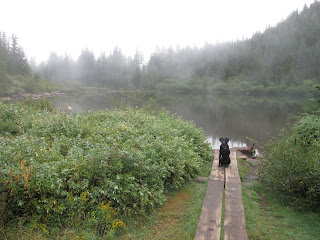Let me share some core truths about myself:
1. I am always right.
2. I think I am always right.
3. I don't like admitting that I'm wrong.
4. I like winning. A lot.
All of these things sometimes complicate the compromise that is necessary when raising & training dogs together. I'm sure I'm not the only one who has had one of these conversations:
Hubster: You give the dogs too many treats.
Me: You don't use treats to shape, lure & reinforce behaviors enough.
and then later:
Hubster: Why won't Hurley sit for me but he sits for you?
Me: I give him too many treats. :P (yes, I do actually stick my tongue out at the poor Hubster)
As we tackle each new training issue that comes along with every one of our dogs, our training know how reaches its limits and we have to learn something new in order to overcome the problem at hand. Oftentimes, this raises some conflicts between the two of us on the best route to take when training our dogs. The Hubster and I aren't too far apart on our training philosophies. Neither of us want to use harsh training methods and each of us prefers to use training methods that we, respectively, are more talented at. I fall back on the "I can get my dogs to do anything with a treat in my hand" positive reinforcement style of training while the Hubster goes with his "I'm the boss and the dogs do what I want 'cause they respect me" Leader of the Pack style of training. While each of us dabbles in the other's methods, we certainly have our strengths which drives our training preferences. And neither of us are wholly right or wholly wrong.
So when Hurley started displaying resource guarding issues, both of us struggled with what we knew and didn't know. We struggled with each other's philosophies and, in all honesty, did not see eye to eye regarding the correct path forward.
Enter compromise.
The first thing we did to get on the same page was sit down and map out the commands, rewards and punishments we utilize. Yes we have a spreadsheet now. What behaviors still needed treats to help shape and reinforce and which ones should Hurley do without a treat each and every time? How many times will we ask for the behavior? What will we do if he doesn't obey? In what specific situations do we always require a certain behavior from him? What verbal commands and what hand signals do we use?
Though lengthy, that was the easy part. We were already on the same page 99% of the time but the exercise helped us identify areas where we might be sending conflicting messages to the dogs.
The harder part was coming to a compromise on who we sought professional help from to help us with what we didn't know - how to proceed with Hurley's resource guarding behavior. The Hubster quickly found a Leader of the Pack style trainer while I offered up a positive reinforcement class. In the end, I agreed to go with the trainer that he had found for several reasons:
- Positive reinforcement and Leader of the Pack training are not mutually exclusive. One of the reasons why I haven't felt comfortable with his style of training is that I suck at it. I need guidance on what rules to institute in the home to give Mr. I'm-All-That Hurley more structure and reinforces who's in charge. I need to learn how to correct my dogs without showing frustration or anger. I also have found that, with 3 dogs, pack dynamics and understanding them is much more critical than ever before. And while we have taken a positive reinforcement based class with Maggie, we have not taken a Leader of the Pack based training class. In short, we've had professional guidance in one method and not the other.
- I spent about 1/2 hour on the phone with the trainer we selected to ensure that I felt comfortable that he was not too harsh in his methods, that he would respect where I drew the line and that he would help the Hubster and I continue to find ways to compromise and complement each other.
- The Hubster agreed that we will continue not to use the methods I am opposed to: choke chains, prong collars, harsh corrections, alpha rolls, etc. In return, I offered up the Martingale collar as a training tool and agreed to use it throughout the duration of the training class (though I still prefer the front clip harness). I promised to not let Hurley up on the bed for the duration of the class.
I guess if I could sum up our compromise, it would be this: We will correct Hurley's behavior when he misbehaves and we will reward him when he does behave. We will shape new behaviors utilizing rewards in the beginning but phase them out more quickly.
The last couple weeks have been hard on us as we struggle to figure this all out. But today, we go hand-in-hand-in-leash to our training class together. We know the core of our compromise and path forward and while details will still be ironed out, we are in a good place. And Hurley is in the best place he can be - our family.
























